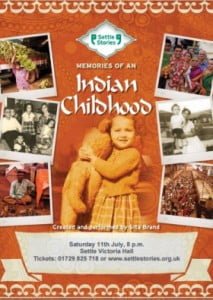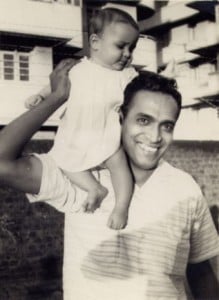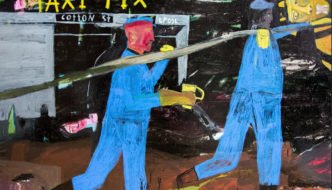Preview: Memories of an Indian Childhood from Sita Brand of Settle Stories
July 9, 2015
[Images courtesy of Settle Stories]
While the beautiful Dales town of Settle may seem far removed from the bustling heart of Leeds, it is in fact just an hour by car or train, making it a perfect excursion for a summer evening, to see storyteller Sita Brand present her Memories of an Indian Childhood. For Sita, though, who is also the founder of Settle Stories, there was a far greater journey involved, from 70s Bombay to the heart of rural Yorkshire. I caught up with her for a flavour of the event taking place this Saturday. For more details, see the website.

Memories of an Indian Childhood
TSOTA: What is Settle Stories?
SB: Settle Stories is an Arts and Heritage organisation that wants to change the world through stories!

TSOTA: That’s a modest ambition!
SB: We do it in three ways. One is through year-round events and a flagship festival; through the WR Mitchell Archive, which is about Yorkshire stories; and a learning programme, which is mostly in schools, but we also have public workshops.
A story is the most powerful medium of human communication. When we communicate with one another through stories, we can learn from one another and we touch each other in a way that facts and information don’t do. It’s the capacity that stories have to move people, and that means that the people listening care about those people in the story.
TSOTA: What connects Settle with a story-telling tradition?
SB: When I first started with a festival, five years ago, I remember a local councillor coming to see me, and he said, “This is what we’re about! We don’t do all those literary things: we like talking to each other, and this is right for Settle.” There isn’t an age-old tradition that one can point to, but within Yorkshire and in the Dales, people communicated through stories and telling their families about farming the land, about ancient traditions, about the stone walling, etc. These stories are captured through the conversations that Bill Mitchell had that we are now trying to digitise within the WR Mitchell archive. There is a tradition within the Dales, although people would not necessarily have described it as a storytelling tradition.
I came here and I started it up, and it’s grown. We started in 2010. This year, instead of a festival, we’re having a party in October, and from the 1st-3rd April 2016, we’re having the festival. We’re moving the festival to Easter.
TSOTA: Has the festival been taken to the heart of the people of Settle?
SB: It certainly has. Yesterday, I met someone who said, “I used to work in schools and sometimes kids struggled with reading but they wanted to share and tell stories, and you doing this is really important work.”
We go into most of the schools regularly. The expectation is that storytellers will come into the school at certain points in the year.

TSOTA: In addition to being a centre for walking and for the railway, how important is it for Settle to have another feature making it unique?
SB: That was a driving force for why I set up the festival in the first place. I saw a lot of empty shops, and I am the kind of person who’s a doer, and I thought, “What can I do?” I come from an arts and heritage background, I started life as a storyteller and I’ve run all sorts of events, and I thought, “Well, we could have a festival and bring people here.” Also, by the organisation being called Settle Stories, Settle is much more on the map. It has a knock-on effect on how people know a place, and that in turn drives people to the town.
A recent evaluation showed that local traders increase their turnover and have more customers at the time of the festival. All this is very good for the local economy.
TSOTA: You grew up in Bombay, but I understand you have a Yorkshire connection?
SB: I do! My mother is English and was brought up in Durham, but her grandfather came from Hull.
TSOTA: Without spoiling your show on Saturday, to which I am greatly looking forward, can you give an idea of the events that took you from Bombay, and the journey that led to Settle?
SB: The show just takes me up to leaving India. We came to England in the late 70s when I was in my teens. There were lots of reasons why we came, but India was plunged into a state of emergency in 1975 and there were political implications, but my grandfather was also here.

Sita Brand with her father
The show itself is very much about growing up, about childhood, all the things that happen to everyone: you grow up, you’re naughty at school, you fall in love, you’re heart’s broken… The setting is different, because it’s India and it’s Bombay, but I’m sure many people will be able to empathise. My father was a refugee, so some of his story comes out, but being a teenager at a time of political unrest was a very different and interesting experience. I hope people will find it funny, moving endearing, and allow them to remember their own growing up.
TSOTA: What is the difference between a storyteller and a writer? What can people who have never been to see a storyteller (especially as an adult) expect to be different about the experience?
SB: The difference is that, in a written piece, it’s very set. When you have a writer that is reading, they have spent time and energy to craft those words, and they deliver those words. With a piece of pure storytelling is that you react to and can work with an audience. There is no script. You have some prompts, but you weave the story in front of the audience. In all honesty, this piece is a mixture of written work and storytelling. It’s my life story intermixed with traditional folk tales.
Interview by Mike Farren
For more on Settle Stories call 01729 822292 or email them at [email protected]
You can also follow them on Facebook or Twitter @settlestories or visit their website
Filed under: Written & Spoken Word
Tagged with: interview, preview, settle stories, Sita Brand, stories



Comments